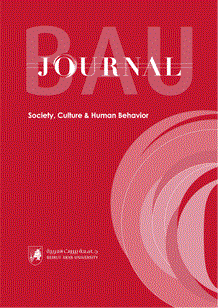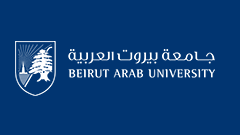Volume 2, Issue 2 (2021)
Ahmed M. Abdel-Khalek - Professor of Psychology, Alexandria University
The present volume of Society, Culture and Human Behavior (SCHB) is an important outlet for publishing original research in the humanities and social sciences. The SCHB occupies a high rank in this field, not only in Beirut Arab University, but also in the Arab World and other countries, and, thus, successfully polarizes original research from different specialties in many countries. One of the salient advantages of the SCHB Journal is its trilingualism, as it publishes papers in Arabic, English and French. Furthermore, the bilingual abstracts are very useful for researchers.
The present volume of the SCHB contains 13 original research papers from different disciplines, i.e., psychology, literature, history, management, economics, and accounting. For me, I read most of these papers with much interest.
Psychology papers have the lion’s share, i.e., four papers. The first one is written by Professor Bader Alansari on the psychometric properties of a very important psychological inventory, the Depression-Anxiety-Stress scales. He recruited a large Kuwaiti sample of college students (N = 1,677). The second study is written by Shweta and Ajai Singh on the validation of the parent-adolescent relationship scale. A large Indian sample (N = 1,000) took part in this study. The third paper was written by the afore-mentioned two authors on the association between resilience, emotion regulation, peer relationship, humor, and body esteem using an Indian sample. The fourth and the last psychology study was written by Triveni Vernal on the coping strategies, self-care, and the mental health of caregivers of individuals with autism during the Covid-19 pandemic. All the last-mentioned studies tap important themes in the fied of psychology.
Two well-written papers of high caliber were from the English Department. The first is written by Essam Fattouh on William Empson as a poet and as an origin for literary theory. Laila Helmi is the author of the second paper, which focuses on the history and rise of digital humanities, an important topic in the present century.
In the field of history, two papers were written pertinent to the Ottoman era. Prof. Hassan Hallak writes on the Ottoman constitutional experience under Sultan Abdel-Hamid II. Professor Mustafa Ozturk from University of Izmir writes on a chapter of Beirut history at the end of the nineteen century and the beginning of the twentieth century.
From the Department of Management, Beirut Arab University, two studies are included in the present issue. Abou Ali et al., write on the role of the country of origin, perceived value, trust, and influencer marketing in determining purchase intention in social commerce. The second paper is written by Sakina El Jisr et al. It investigates the nature of the relationships between leader-member exchange, locus of control, and co-worker cooperation. The outcomes were job satisfaction and turnover intention. This paper is par excellence under the rubric of interdisciplinary studies. It connects between the management variables and important factors in industrial and managerial psychology.
From the Department of Accounting in the Faculty of Business Administration, the present issue of the Journal contains two studies. The first study is written by Christina Al Hajjar et al. It examines the association between internal corporate governance and earning management in Islamic and conventional banks in the Middle East and North Africa (MENA) region.
Maggie Houshaimi from the Department of economics in the Faculty of Business administration, Beirut Arab University writes a paper on financial structure and systemic risk in the MENA region.
I wish the Editorial Board of the SCHB success, the readers of this excellent periodical the pleasure of reading inspiring scholarly papers.
Articles
DIGITAL HUMANITIES: A PARADIGM FOR THE 21ST CENTURY
Laila C.A. Helmi
RESILIENCE, EMOTION REGULATION, PEER RELATIONSHIP, HUMOR AND BODY-ESTEEM IN INDIAN COLLEGE STUDENTS
Shweta Singh and Ajai Pratap Singh
VALIDATION OF THE FACTOR STRUCTURE OF THE PARENT-ADOLESCENT RELATIONSHIP SCALE IN THE INDIAN CONTEXT
Shweta Singh and Ajai Pratap Singh
FINANCIAL STRUCTURE AND SYSTEMIC RISK: EVIDENCE FROM SELECTED MENA REGION COUNTRIES
Maggie J. Houshaimi
SELF CARE, MENTAL HEALTH AND COVID-19: AN EXPLORATORY STUDY OF THE COPING STRATEGIES OF CAREGIVERS OF INDIVIDUALS WITH AUTISM DURING THE PANDEMIC (IN HYDERABAD, INDIA)
Triveni Goswami Vernal
THE ROLE OF COUNTRY OF ORIGIN, PERCEIVED VALUE, TRUST, AND INFLUENCER MARKETING IN DETERMINING PURCHASE INTENTION IN SOCIAL COMMERCE
Ali A. Abou Ali, Alaa A. Ali, and Nehale Mostapha
THE EFFECT OF LEADER-MEMBER EXCHANGE, CO-WORKER COOPERATION AND LOCUS OF CONTROL ON EMPLOYEE OUTCOMES IN LEBANESE SMES: PERCEPTIONS OF POLITICS AS A MEDIATOR
Sakina El Jisr, Abdul Rahman Beydoun, and Nehale Mostapha
THE IMPACT OF CORPORATE GOVERNANCE ON EARNINGS MANAGEMENT IN ISLAMIC AND CONVENTIONAL BANKS
Christina A. Al Hajjar, Ekramy S. Mokhtar, and Mohamed M. Mandour
AUDIT REPORT LAG: DO COMPANY CHARACTERISTICS AND CORPORATE GOVERNANCE FACTORS MATTER? EMPIRICAL EVIDENCE FROM LEBANESE COMMERCIAL BANKS
Rasha M. Nouraldeen, Mohamed Mandour, and Wagdi Hegazy
Translated Article


